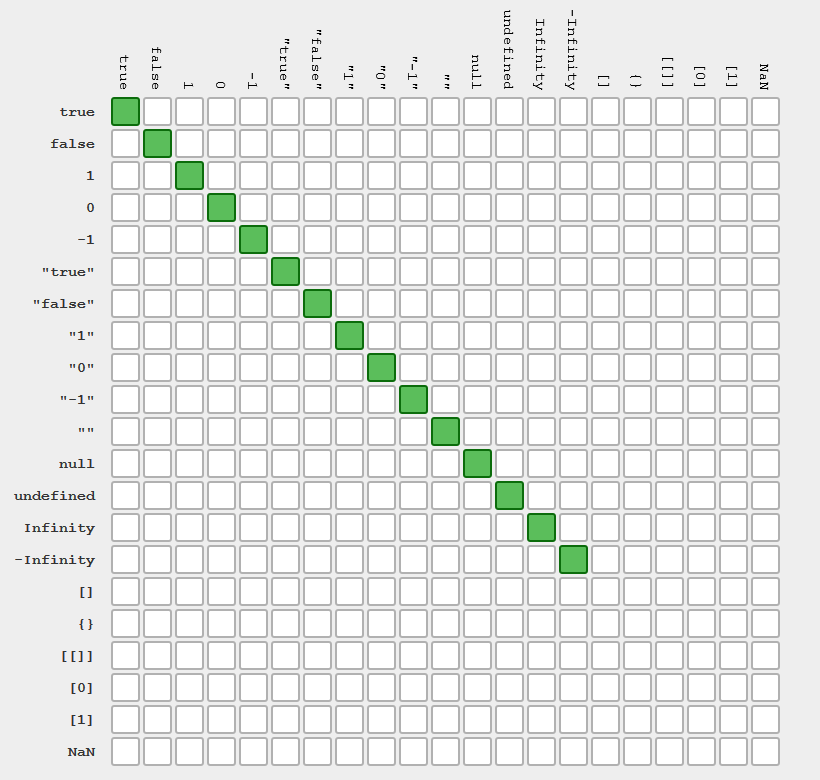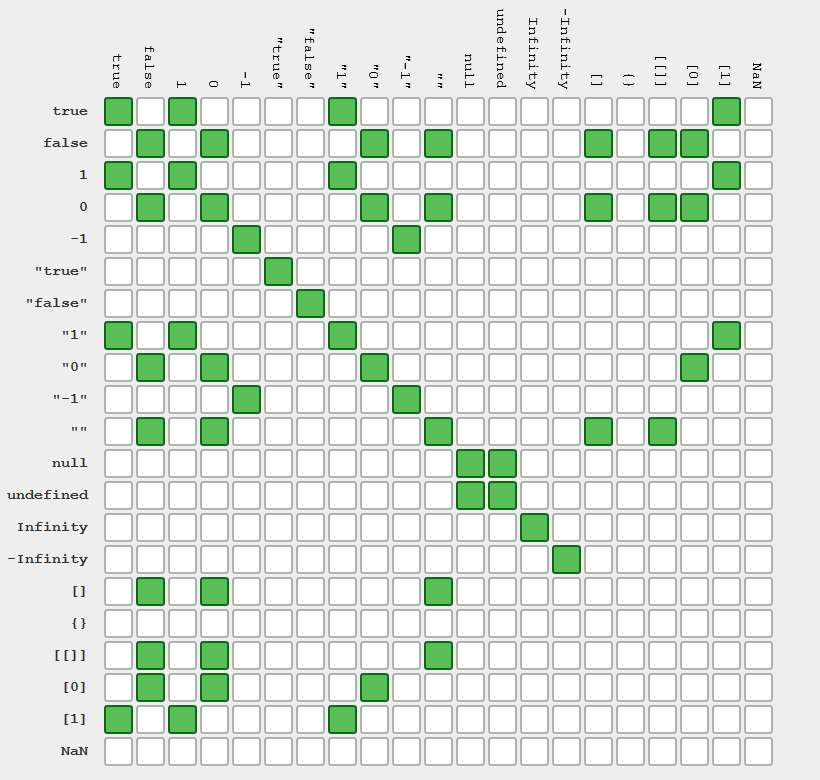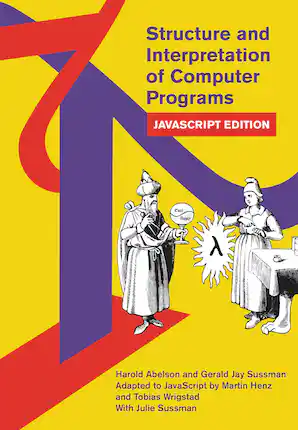Douglas Crockford: “JavaScript is the only language (that I'm aware of) where people feel they don't need to learn it before using it.”
- Main influences:
- Scheme (Functions)
- Self (Prototypes)
- Java (Syntax)
- Perl (Regex)
- Initial version “Mocha”
- written during 10 days in May 1995
- by Brandan Eich @ Netscape
Mocha
LiveScript
JavaScript
| (JScript)
| | ES1 ES2 ES3 ES5 ES6
| | | | | | |
+---+---+---+---+---+---+---+---+---+---+---+---+---+---+---+---+---+---+---+---+---+---+---
93 94 95 96 97 98 99 00 01 02 03 04 05 06 07 08 09 10 11 12 13 14 15
| | | | | | | | | | | | |
| | Internet | JSON | | Ajax jQuery | Node.js Electron.js |
| | Explorer XMLHTTP | | | |
| | | Mozilla Google Microsoft
| Netscape | Firefox Chrome Edge
| Navigator |
| Apple
Mosaic Safari
- Yearly releases since ECMAScript 2016 (ES7)
<!DOCTYPE html>
<html>
<head>
<meta charset="UTF-8">
<link rel="stylesheet" href="pretty.css">
<script defer src="bundle.js"></script>
</head>
<body>
<div style="display: flex">
<textarea id="output" style="flex: 0px" rows="50"></textarea>
</div>
</body>
<script>
// ...
let response = await fetch("https://raw.githubusercontent.com/frectures/js/master/README.md");
let text = await response.text();
document.getElementById("output").value = text;
// ...
</script>
</html>- Browser (frontend)
- HTML (HyperText Markup Language)
- CSS (Cascading Style Sheets)
- JS (JavaScript)
- DOM (Document Object Model)
- Node.js (backend)
- JavaScript runtime environment built on Chrome's V8 JavaScript engine
- High-performance, asynchronous server code
- Electron.js = Chromium + Node.js (cross-platform desktop applications)
- Atom
- Discord
- Microsoft Teams
- Skype
- Visual Studio Code
- Dynamically typed
- Primitive types
booleanfalsetrue
number(double precision floating point)0.1 + 0.2 === 0.300000000000000041.0 + 2.0 === 3.0- Contains all integers up to 253 =
9_007_199_254_740_992
bigint(arbitrary precision integer)123nBigInt(456)
string(UTF-16)"Ain't no sunshine"'The cow says: "Moo"'`Frantic fans: "It's great!"`"🤨".length === 2- UTF-16:
55358, 56616(Java, C#, JavaScript) - UTF-8:
240, 159, 164, 168(Go, Rust, Swift)
- UTF-16:
undefined(mostly bugs)- uninitialized variables
- function calls without return value
- missing function arguments
- missing object properties
- array index out of bounds
null(intentional absence)
- Reference types
ObjectFunctionArray- ...
Exercise:
- Evaluate the following expressions in the browser console (F12)
- Which results do you find surprising?
typeof false
typeof 3.14
typeof 123n
typeof "hello"
typeof "hello"[0]
typeof undefined
typeof null
typeof {}
typeof Math.log
typeof []Martin Fowler: “Choosing JavaScript was deeply ironic for me, as many readers may know, I'm not a fan of it. It has too many awkward edge cases and clunky idioms. But the compelling reason for choosing it over Java is that JavaScript isn't wholly centered on classes. There are top-level functions, and use of first-class functions is common. This makes it much easier to show refactoring out of the context of classes.”
varvariables have function scope:
function f() {
console.log(x); // undefined
{
console.log(x); // undefined
var x = 42;
console.log(x); // 42
}
console.log(x); // 42
} letvariables have block scope:
function f() {
console.log(x); // ReferenceError: x is not defined
{
console.log(x); // ReferenceError: x is not defined
let x = 42;
console.log(x); // 42
}
console.log(x); // ReferenceError: x is not defined
} constrequires initialization and forbids mutation of the variable:
function f() {
const uninitialized; // SyntaxError: Missing initializer in const declaration
const x = 42;
x = 97; // TypeError: Assignment to constant variable
const account = new Account();
account.deposit(42); // okay: mutates referenced object, not account variable
account = new Account(); // TypeError: Assignment to constant variable
}- Type-safe equality via
===and!==(compares type and value)
- Type-unsafe equality via
==and!=(confusing type coercions)
- There is no universal
equalsmethod for object equality
function releaseYearOfEcmaScript(version) {
if (version < 1) throw new Error(`non-positive ECMAScript version ${version}`);
// /////
switch (version) {
//////
case 1: return 1997;
case 2: return 1998;
case 3: return 1999;
case 4: throw new Error("abandoned ECMAScript version 4");
case 5: return 2009;
default: return (version >= 2015) ? version : 2009 + version;
} ////// /// ///
}Exercise:
releaseYearOfEcmaScripthandles some illegal inputs (such as 0 and 4)- Can you think of more illegal inputs to
releaseYearOfEcmaScript?- Handle those illegal inputs as you see fit
- Technically, conditions are not restricted to
booleanvalues:
function f(value) {
if (value) {
return "truthy";
} else {
return "falsy";
}
}
f(42) // truthy
f( 0) // falsy
f("0") // truthy
f("") // falsy- The following equivalent function explicitly lists all falsy values:
function g(value) {
const falsyValues = [ false, NaN, 0, -0, 0n, "", undefined, null ];
return falsyValues.includes(value) ? "falsy" : "truthy";
}- For the sake of maintenance, prefer
booleanvalues in conditions
Exercise:
- Replace the array in function
gwith aswitch- Is
gstill equivalent tof? Try all falsy values!
for (let i = 0; i < s.length; ++i) {
console.log(s[i]);
}
let x = 1;
while (x + 1 > x) {
x *= 2;
}
console.log(`${x} is the smallest integer without odd successor`);
let password;
do {
password = readPassword();
} while (password !== "Simsalabim");Exercise:
- Write a
forloop that logs all divisors of42
- Hint:
dividend % divisor === rest- Start with
x = 27and write awhileloop that logsxand transforms it once per iteration:
- If
xis even, dividexby 2- If
xis odd, multiplyxby 3 and increment- Stop the loop when
xreaches 1
function average1(x, y) {
return (x + y) / 2;
}
const average2 = function (x, y) {
return (x + y) / 2;
};function average1does not prevent accidental reassignment:average1 = "😱";const average2 = functioncannot be called above its definition- Missing arguments are initialized to
undefined - Extra arguments are ignored
- Implicit
return undefined;at the bottom
Exercise: Write a function
isPerfectNumber(x)
- The divisors of a perfect number add up to twice that number
- The first 4 perfect numbers are 6, 28, 496 and 8128
- Can we extract the essence of
fixCosandfixSqrtinto onefixfunction?
| fixCos | fixSqrt |
|---|---|
function fixCos() {
let x = 0.0;
do {
// 0
// 1
// 0.5403023058681397
console.log(x);
// 0.7390851332151608
// 0.7390851332151606
// 0.7390851332151607
} while (x !== (x = Math.cos(x)));
return x;
}
fixCos(); |
function fixSqrt() {
let x = 0.5;
do {
// 0.5
// 0.7071067811865476
// 0.8408964152537146
console.log(x);
// 0.9999999999999997
// 0.9999999999999998
// 0.9999999999999999
} while (x !== (x = Math.sqrt(x)));
return x;
}
fixSqrt(); |
- Yes, by abstracting over
fandx:
function fix(f, x) {
do {
console.log(x);
} while (x !== (x = f(x)));
return x;
}
fix(Math.cos, 0.0);
fix(Math.sqrt, 0.5);
fix(function (x) { return x/2; }, 1.0);fix((x) => x/2, 1.0);
fix( x => x/2, 1.0);- JavaScript hipsters prefer arrow functions everywhere:
const average3 = (x, y) => (x + y) / 2;- In practice, you will encounter two “kinds” of objects:
- Object literals / JSON (JavaScript Object Notation)
- Class objects
- Technically, there is only 1 kind of object, but the whole truth is quite complicated
- A JavaScript object is essentially a
java.util.LinkedHashMap<String, Object>
// Object literal
const inventor = { forename: "Brandon", surename: "Eich" };
// read properties
inventor.forename // 'Brandon'
inventor["surename"] // 'Eich'
// write properties
inventor.forename = "Brendan"; // { forename: 'Brendan', surename: 'Eich' }
inventor["year"] = 1961; // { forename: 'Brendan', surename: 'Eich', year: 1961 }
// delete properties
delete inventor.forename; // { surename: 'Eich', year: 1961 }
// JSON
const str = JSON.stringify(inventor); // '{"surename":"Eich","year":1961}'
const twin = JSON.parse(str); // { surename: 'Eich', year: 1961 }- Quotation marks around keys are:
- optional in literals
- mandatory in JSON
class Account {
static instanceCounter = 0;
constructor(initialBalance, accountId) {
this.balance = initialBalance;
this.id = accountId;
Account.instanceCounter += 1;
}
deposit(amount) {
this.balance += amount;
}
getBalance() {
return this.balance;
}
}
const account = new Account(1000, 42);
account.deposit(234);
account.getBalance() // 1234Even though ECMAScript includes syntax for class definitions, ECMAScript objects are not fundamentally class-based such as those in C++, Smalltalk, or Java
- The
class Accountexample desugars to:
function Account(initialBalance, accountId) {
this.balance = initialBalance;
this.id = accountId;
Account.instanceCounter += 1;
}
Account.instanceCounter = 0;
Account.prototype.deposit = function (amount) {
this.balance += amount;
};
Account.prototype.getBalance = function () {
return this.balance;
};- Key points to remember:
new T()objects store fieldsT.prototypeobject stores methodsnew T().__proto__ === T.prototypeTobject stores static fields
- Less rigid than the
classkeyword may suggest:
const account = new Account(1000, 42);
// add field to object
account.audited = true;
// delete field from object
delete account.id;
// deactivate method for object
account.deposit = undefined;
// delete method from class
delete Account.prototype.deposit;
// change an object's class after creation
account.__proto__ = SavingsAccount.prototype;Exercise:
- Study the “Object literals / JSON” example again
- Then complete the function
countWords:
function countWords(str) {
// TODO create empty object
for (const word of str.match(/\w+/g)) {
// TODO increment value of key word in object
}
// TODO return object
}
countWords("Wenn hinter Fliegen Fliegen fliegen, fliegen Fliegen Fliegen nach.")
// { Wenn: 1, hinter: 1, Fliegen: 4, fliegen: 2, nach: 1 }
countWords("The constructor does not CREATE objects; The constructor INITIALIZES objects!")
// Do you notice something weird?
countWords("Most JavaScript objects have a special __proto__ property related to inheritance.")
// Do you notice something weird?Exercise:
- Apparently, object literals
{}have pitfalls for dynamic keys- Replace the object literal
{}with anew Map()(ES2015)
- pertinent methods:
has,get,set
const primes = [2, 3, 5, 7];
typeof primes // 'object'
Object.getOwnPropertyNames(primes) // [ '0', '1', '2', '3', 'length' ]
primes.length // 4
primes[0] // 2
primes[4] // undefined
primes[4] = 11; // [ 2, 3, 5, 7, 11 ]
primes.push(13); // [ 2, 3, 5, 7, 11, 13 ]
primes.push(17, 19); // [ 2, 3, 5, 7, 11, 13, 17, 19 ]
primes[24] = 97; // [ 2, 3, 5, 7, 11, 13, 17, 19, <16 empty items>, 97 ]
primes.length = 5; // [ 2, 3, 5, 7, 11 ]
primes.pop(); // [ 2, 3, 5, 7 ]- JavaScript arrays are JavaScript objects with a special
lengthproperty- The keys are stringified numbers
- The (mutable!)
lengthproperty is the largest index +1 - There are no “array index out of bounds” errors:
- Reading from such an index gives
undefined - Writing to such an index grows the array
- Reading from such an index gives
Exercise: Write a function
divisors(x)that returns an array containing all divisors ofx
for (let i = 0; i < primes.length; ++i) {
console.log(primes[i]);
}
for (const value of primes) {
// 2, 3, 5, 7
console.log(value);
}
for (const index in primes) {
// '0', '1', '2', '3'
console.log(index);
}
primes.forEach(function (value, index, array) {
array[index] = -value;
});// sort by toString() value
primes.sort();
// [ 11, 13, 17, 19, 2, 3, 5, 7 ]
// sort by numeric value
primes.sort((a, b) => a - b);
// [ 2, 3, 5, 7, 11, 13, 17, 19 ]const people = [
{ forename: "Alan", surename: "Turing", year: 1912 },
{ forename: "Alan", surename: "Kay", year: 1940 },
{ forename: "Bjarne", surename: "Stroustrup", year: 1950 },
{ forename: "Brian", surename: "Kernighan", year: 1942 },
{ forename: "Dennis", surename: "Ritchie", year: 1941 },
{ forename: "James", surename: "Gosling", year: 1955 },
];
const whippersnappers = people.filter(person => person.year >= 1950);
const years = people.map(person => person.year);
// [ 1912, 1940, 1950, 1942, 1941, 1955 ]
const yearSum = people.reduce((sumSoFar, person) => sumSoFar + person.year, 0);
// 0 + 1912 + 1940 + 1950 + 1942 + 1941 + 1955
const sortedByYear = people.toSorted((a, b) => a.year - b.year);
const sortedBySurename = people.toSorted((a, b) => a.surename.localeCompare(b.surename));Exercise: Simplify the function
isPerfectNumber(x)with the previous functiondivisorsand thereducemethod
- One
.jsfile per module - Explicit
exports andimports - In theory, browsers support modules via
<script type="module" src="mod.js">(implicitdefer)⚠️ requires web server; can't just “double-click onindex.html”
- In practice, modules are usually bundled into a single
bundle.jsfile by module bundlers like Webpack
// trig.js
export const PI = 3.141592653589793;
const RADIANS_PER_DEGREE = PI / 180; // not exported
export function radians(degrees) {
return degrees * RADIANS_PER_DEGREE;
}
export function degrees(radians) {
return radians / RADIANS_PER_DEGREE;
}
export function distance(x, y) {
return Math.sqrt(square(x) + square(y));
}
// not exported
function square(x) {
return x * x;
}// app.js
import { PI, distance as distanceFromOrigin } from './trig';
const distance = 1.5;
console.log(PI);
console.log(distanceFromOrigin(3, 4));// app.js
import * as trig from './trig';
const distance = 1.5;
console.log(trig.PI);
console.log(trig.distance(3, 4));





